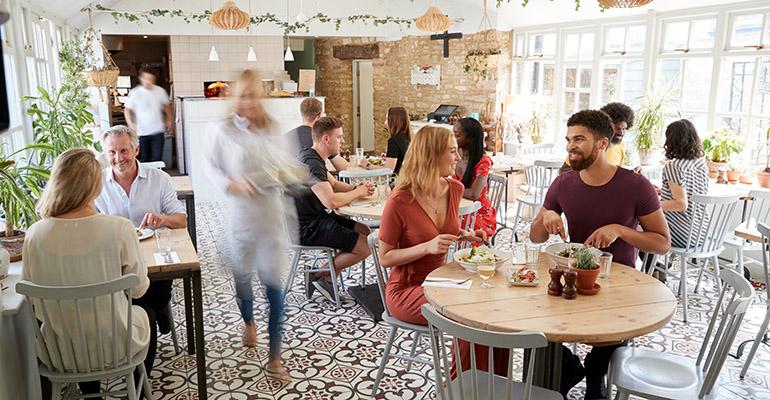Of all the hundreds of dining options, what is it that makes a person return to a restaurant or a bar so often that they don’t just have their favorite drink poured upon sitting, but in fact, everyone there truly does know their name?
Make them feel great
More often than not, it’s not the silkiness of the asparagus soup or the perfect dilution ratio of the vodka Martinis, but something much simpler, much more primal — it’s the feeling of being acknowledged, and made to feel truly appreciated. The operations that do this best know that the art of turning casual diners into regulars requires not only 21st century tools, but also human skills. It’s called the hospitality industry for good reason.
 Photo: Erik Segelbaum
Photo: Erik Segelbaum“Regulars are our bread and butter,” said Erik Segelbaum, founder and owner of hospitality consulting firm Somlyay, and formerly the corporate beverage director for Stephen Starr Restaurants. “Cultivating a clientele of ‘friends of the house’ who feel comfortable, known and welcome, will lead to them wanting to spend more time, and consequently more money, in your establishment.”
Jeff Taylor, senior fine wine consultant at Morrell Wine & Company in New York City, a role he recently took after spending more than 20 years working in restaurants, including stints at Manhattan’s Eleven Madison Park, Betony, and North End Grill, quotes poet Maya Angelou when he explains what’s at the core of hospitality: “People will forget what you said, people will forget what you did, but people will never forget how you made them feel.”
“I think that someone becomes a regular when they feel not only recognized by the staff and management, but when they feel an almost shared ownership of the place,” he added. “This person is going to want to take their friends and colleagues, as well as their family members, for birthdays and anniversaries to ‘their’ restaurant.”
Remember the little things
Whether your operation just opened last week or has been passed down over the generations, it’s imperative to set up systems and carry out training to identify and take care of regular diners.
“In a city like New York, the next cool thing is always popping up and the hype of a new restaurant only lasts so long,” said Katie Venezia, sommelier at Gramercy Tavern, which opened in 1994 and remains hot to this day. “It's important to cultivate regulars for the sake of longevity, and Gramercy Tavern is a great example of how that can benefit a restaurant for decades. A lot of our regulars dine here several times per week, so it's all about finding new and different ways to make them feel special.”
 Photo: Katie Venezia
Photo: Katie VeneziaSavvy operators keep extensive notes on regulars in their reservation systems, including everything from wine or table preferences and dietary restrictions to names of their children and dates of special occasions. And since most of these guests do make a reservation, when they arrive, small “soignée” slips that include important guest info are given to staff, along with any specific instructions, such as whether a manager’s presence (or multiple managers’) is required, and/or if any comped items are to be sent.
“I think one of the most important things to happen to restaurant culture in the last few decades is having a “line-up” meeting where the dining room and kitchen staff discuss that night's service,” Taylor said. “By far the greatest was at Eleven Madison Park, where line-ups could last up to an hour. In fact, there would be a manager meeting before that line-up with the maître d' and reservation team to go over what we were going to do for each regular guest — whether that was greeting them with their favorite cocktail on arrival, adding an extra course, giving them a kitchen tour, or calling them a cab at the end of dinner.”
Comping for success
One big area for owners and managers to draw clear lines around is the approach to comping of items for regular guests. “I’m a fan of sending a token gesture,” Segelbaum said. “It needn’t be expensive. My favorite thing is to give a small nibble that isn’t on the menu. As a sommelier, I also like to give them a little taste of something, some dessert wine or a welcome tipple.”
 Photo: Jeff Taylor
Photo: Jeff Taylor“Try to vary the comps” Taylor said. “It's easy to always just send out an extra course, but it is much more rewarding for the house and the guest to think a little bit more outside the box in terms of comps and perks.” In fact, those perks can take many different forms, he said, including a coveted reservation time provided at the last minute, giving them the best table in the house, or a tour of the wine cellar or kitchen.
“Sometimes it's helping them with other reservations for restaurants or inviting them to special events the restaurant is doing,” he said.
They’re good for morale, too
Cultivating regulars also goes both ways: Those frequent guests are clearly happy with what their favorite spot is offering, but they also serve as a morale boost for staff.
“Regulars create consistent business, yes,” said Derrin Abac, general manager at Spago on the Hawaiian island of Maui. “But more than that, it gives all of us a sense that what we are doing is making an impact on someone who wants to spend their time and hard earned money with us. It makes the staff feel accomplished, as they know they are doing great when guests come back to specifically see them. This creates a positive interaction, and the staff feel empowered, confident, and accomplished.”
David Flaherty has more than 20 years of experience in the hospitality industry. He is a certified specialist of wine, a certified cicerone and a former operations manager and beer and spirits director for Hearth restaurant and the Terroir wine bars in New York City. He is currently marketing director for the Washington State Wine Commission and writes about wine, beer and spirits in his blog, Grapes and Grains.





